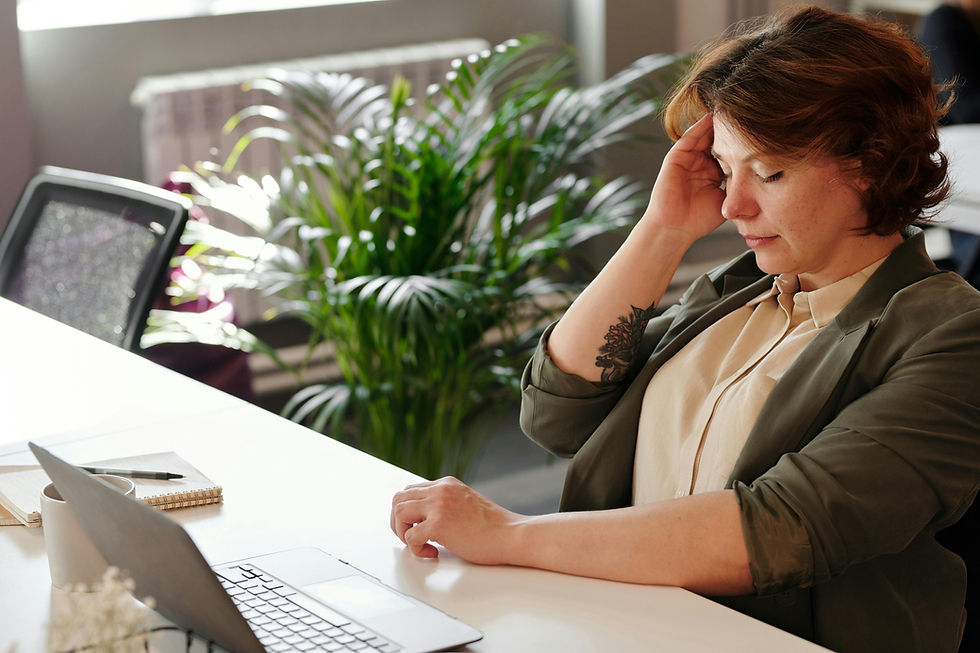The Three Biggest Factors That Affect Your Sleep
- Amy

- Jan 9, 2024
- 4 min read
Updated: Apr 11, 2024
As we are all trying to achieve a good night’s sleep in a world that’s determined to keep us awake and stimulated, it's crucial to understand the factors that will have the biggest impact on if you achieve quality sleep or not. In this article, we delve into the three biggest influencers that can significantly impact your precious shut-eye: light, stress, and alcohol.

1. Light:
The first key player in the sleep game is light. Our bodies are intricately tuned to the natural circadian rhythm, a biological clock that regulates the sleep-wake cycle. Exposure to light, especially natural sunlight outdoors, helps synchronize this internal clock, signalling when it's time to be awake and alert (and when it’s time to go to sleep).
How Light Affects Sleep:
Melatonin Production: Light exposure suppresses the production of melatonin, the hormone responsible for inducing sleep. Exposure to bright lights, especially blue light emitted by screens, can disrupt the natural rise in melatonin levels as bedtime approaches.
Alertness and Sleep-Wake Cycle: Exposure to natural light, especially in the morning, helps regulate the circadian rhythm, contributing to increased alertness during waking hours. Conversely, exposure to artificial light, particularly in the evening, can disrupt this cycle, making it more challenging to wind down and feel sleepy at the appropriate times.
Use Light To Your Advantage:
Try and go for a walk outside in the mornings to get some exposure to natural sunlight and help you feel more awake and alert to start your day.
If you live in a country where there are limited daylight hours during certain times of the year such as winter, consider using a light box indoors which can artificially (but still beneficially) give you the burst of morning light you need.
Invest in blackout curtains, dim your lighting in the evening, and consider using devices with a "night mode" that reduces blue light emissions.

2. Stress
In the hustle and bustle of modern life, stress has become an unwelcome companion for many. Chronic stress not only takes a toll on our mental well-being but also seeps into our sleep patterns, making it difficult to achieve restful night’s sleep.
How Stress Affects Sleep:
Hyperarousal: Stress triggers a state of hyperarousal in the nervous system, making it challenging to relax and fall asleep. Racing thoughts and an overactive mind can be barriers to entering the restorative stages of sleep.
Sleep Disruptions: Stress can lead to increased instances of waking up during the night and difficulty falling back asleep. This fragmented sleep prevents the body from completing essential sleep cycles, leaving you fatigued in the morning.
Stress-Relief Strategies For Sleep:
Mindfulness Meditation: Incorporate mindfulness meditation techniques to calm the mind and alleviate stress before bedtime. Focus on deep, intentional breathing and present-moment awareness to promote relaxation.
Progressive Muscle Relaxation (PMR): Practice PMR to systematically tense and then release different muscle groups, promoting physical and mental relaxation. This technique helps release tension and reduces stress, facilitating a more peaceful transition into sleep.
Establishing a Bedtime Routine: Create a consistent pre-sleep routine to signal to your body that it's time to wind down. This can include activities that promote relaxation, such as reading or taking a warm bath.

3. Alcohol
While a nightcap may seem like a tempting way to unwind, the impact of alcohol on sleep is more complex than it appears. While it may initially have a sedative effect, alcohol can disrupt the natural sleep cycle and compromise the overall quality of your rest. Just one glass of wine has been shown to reduce sleep quality by 9% and three glasses by 39%.
How Alcohol Affects Sleep:
Sleep Fragmentation: Alcohol can interfere with the progression through sleep cycles, leading to increased awakenings during the night.
Reduced REM Sleep: Rapid Eye Movement (REM) sleep is crucial for memory consolidation and cognitive function. Alcohol consumption can suppress REM sleep, impacting memory and cognitive performance.
Hydration: Alcohol can also contribute to dehydration, which can exacerbate feelings of fatigue and disrupt sleep quality.
Moderation is Key:
Set Clear Limits: Begin by establishing specific limits on the number of alcoholic beverages consumed weekly, promoting moderation and gradual reduction in alcohol intake.
Substitute with Alternatives: Develop a plan to decrease alcohol consumption by replacing evening drinks with non-alcoholic alternatives or soothing herbal teas, providing a healthier and sleep-friendly choice.
Adopt Mindful Practices: Embrace mindful strategies to wind down for sleep without relying on alcohol. Establish a consistent bedtime routine and engage in relaxation techniques, such as deep breathing or meditation, to create a calming pre-sleep environment.
Seek Support: Enhance your efforts by seeking support from friends, family, or professionals. Having a supportive network can be instrumental in navigating the challenges of reducing alcohol consumption and improving overall sleep quality.

Conclusion:
Understanding the powerful impact of light, stress, and alcohol on your sleep is the first step towards cultivating healthier sleep habits. By addressing these three significant factors, you pave the way for more restful and rejuvenating nights, ultimately enhancing your long term health and well-being. Remember, small changes in your daily routine can lead to significant improvements in the quality of your sleep.

I'm Amy, a Holistic Sleep Coach and Sleep Consultant Practitioner for adults. I help people improve their sleep to feel and perform at their best, using The Good Sleep Method.
If you are looking for 1-1 tailored support to get a better night's sleep and boost your energy levels, book a call with me to get started.
You can read more about me here.
Follow me on Instagram @thegoodsleepmethod




Comments